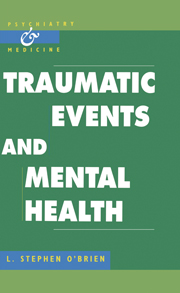Book contents
- Frontmatter
- Contents
- Foreword
- 1 Introduction and historical perspective
- 2 Normal reactions to trauma
- 3 Epidemiology of post-traumatic stress disorder and post-traumatic illness
- 4 Aetiology and predisposing factors
- 5 What constitutes a stressor?
- 6 Post-traumatic illness other than post-traumatic stress disorder
- 7 Diagnosis and assessment
- 8 Management and outcome of post-traumatic illness
- 9 Medicolegal aspects of post-traumatic illness
- 10 Prevention of post-traumatic illness
- 11 The way ahead – whither now?
- Index
9 - Medicolegal aspects of post-traumatic illness
Published online by Cambridge University Press: 05 May 2010
- Frontmatter
- Contents
- Foreword
- 1 Introduction and historical perspective
- 2 Normal reactions to trauma
- 3 Epidemiology of post-traumatic stress disorder and post-traumatic illness
- 4 Aetiology and predisposing factors
- 5 What constitutes a stressor?
- 6 Post-traumatic illness other than post-traumatic stress disorder
- 7 Diagnosis and assessment
- 8 Management and outcome of post-traumatic illness
- 9 Medicolegal aspects of post-traumatic illness
- 10 Prevention of post-traumatic illness
- 11 The way ahead – whither now?
- Index
Summary
In this chapter we will look at the medicolegal connotations of PTI. Where there is a need specifically to address legal practice, the focus will be quite clearly upon the interaction of PTI and law in England and Wales. Aspects of American law have been addressed widely elsewhere, for example by Sparr (Sparr and Boehnlein, 1990) and others. Indeed, almost all of the work concerning PTI and criminal law, as well as much of that concerning civil law, comes from America. There are a number of useful books and pamphlets which specifically address the legal side of the psychiatric injury issues (Napier and Wheat, 1995) (Law Commission 1995) in England and Wales, or in areas with similar basis of law (Mullany and Handford, 1993). An attempt will be made in this chapter to examine both criminal and civil legal issues from the point of view of the expert clinician.
Probably more than any other form of mental illness, PTI is associated with medicolegal issues. It seems that in almost every case of PTI, be it PTSD or another condition, there is at least the potential for some form of legal or quasilegal consequence. There are a number of obvious areas of possible concern:
PTI may be presented as a defence or mitigating factor in criminal cases
PTI may be a consequence of criminal behaviour
PTI may be a consequence of a civil wrong.
- Type
- Chapter
- Information
- Traumatic Events and Mental Health , pp. 242 - 261Publisher: Cambridge University PressPrint publication year: 1998

